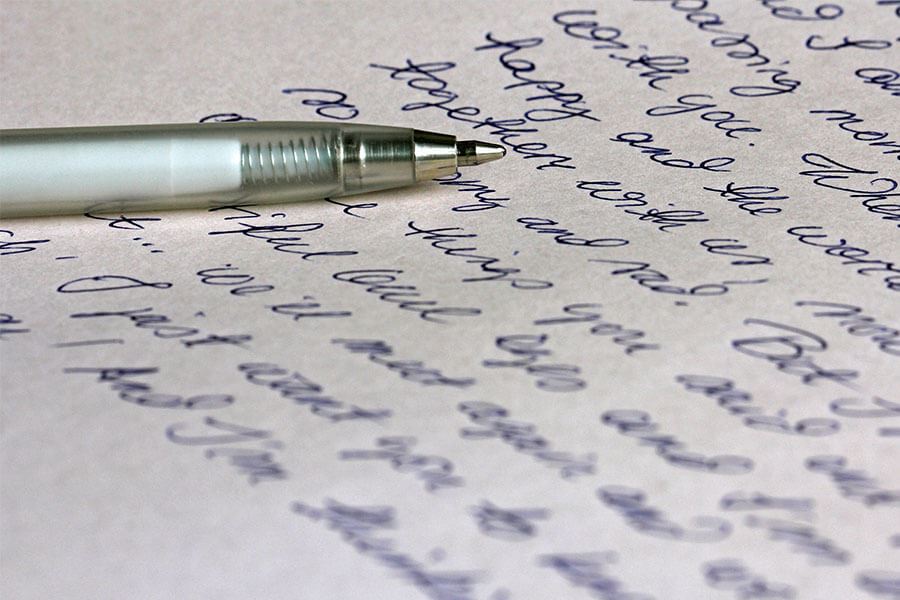
Recently, Notaries have contacted the NNA asking for help when presented with handwritten documents to be notarized. The most common questions are:
- Is it legal to notarize handwritten documents?
- Are there any special procedures Notaries must follow when notarizing handwritten documents?
- Are there any special concerns when notarizing a handwritten document?
Let’s talk about handwritten documents from a legal perspective and answer your questions.
Is it legal to notarize handwritten documents?
Yes, absolutely. In the early years of the United States, most documents were handwritten. Notaries routinely notarized handwritten documents as part of their authorized notarial acts. Even in modern times, many kinds of documents — wills, deeds, contracts, powers of attorney, and so forth — can still lawfully be handwritten. What was permissible and legal in early times is still legal today; Notaries are allowed to notarize handwritten documents. Besides, it is technically the signer’s signature that is notarized, not the document. And, signatures are almost always handwritten.
Are there any special procedures Notaries must follow when notarizing handwritten documents?
However, remember that for a Notary to legally notarize any document, there must be a notarial certificate completed and attached. When a document is handwritten, the notarial certificate attached to it can be handwritten, machine-printed, or machine-typed. Even when a typed or printed document is to be notarized, a Notary is allowed to handwrite the notarial certificate to be attached to it. The law cares about the substance of the document’s content, not so much about the format of the paper instrument. If the content is satisfactory and the certificate wording meets the requirements of your state’s laws, a handwritten notarial certificate is acceptable.
The most likely potential concern when a signer wants a handwritten document notarized is that the document does not include notarial certificate wording. When writing a document, many signers don’t know they need a certificate for the type of notarial act being requested.
If this occurs and a handwritten document is not accompanied by a notarial certificate, the signer — not the Notary! — must choose the kind of notarization to be performed. The Notary can show the signer sample certificate forms for the three main types of document notarizations — acknowledgments, verifications on oath or affirmation, and signature witnessings. Then, the signer can select the act to be performed, and the Notary can either complete and attach a printed version of the chosen certificate form to the handwritten document, handwrite the language of the selected form onto the signer’s document, or handwrite the certificate onto a separate page for attachment to the signer’s document.
Are there any special concerns when notarizing a handwritten document?
Because the general public often misunderstands notarization, the signer may mistakenly believe notarizing will make the handwritten document ‘valid’ or ‘legally binding’ and ask the Notary for advice or guidance. That is wrong; notarization does not validate or legalize an instrument. It is the person’s signature that is notarized, not the contents of the document (and we refer to “notarizing the document” only in common parlance).
If a signer asks you to “legalize” or “validate” a handwritten document, you should tell them that notarization only serves to verify the identity of the signer, their signature, and that the signer is acting willingly and competently. If the signer asks you how to make a document legally binding, tell them you cannot answer those questions, because you could get into trouble for the unauthorized practice of law. Instead, the signer should contact a qualified attorney for legal advice.
As you have learned from this article, handwritten documents can be confusing for signers as well as Notaries. The best course when you’re asked to notarize a signature on a handwritten document is to stick to the basics of Notary law and best practices. Doing so will always keep you on the right path.
Michael Closen is Professor Emeritus at the John Marshall Law School in Chicago, Illinois. A respected consultant on model Notary statutes and legislation, Closen served on the drafting committees for The Notary Public Code of Professional Responsibility and various editions of the Model Notary Act, and authored Professor Closen’s Notary Best Practices: Expert's Guide to Notarization of Documents, which was updated and revised in 2024.